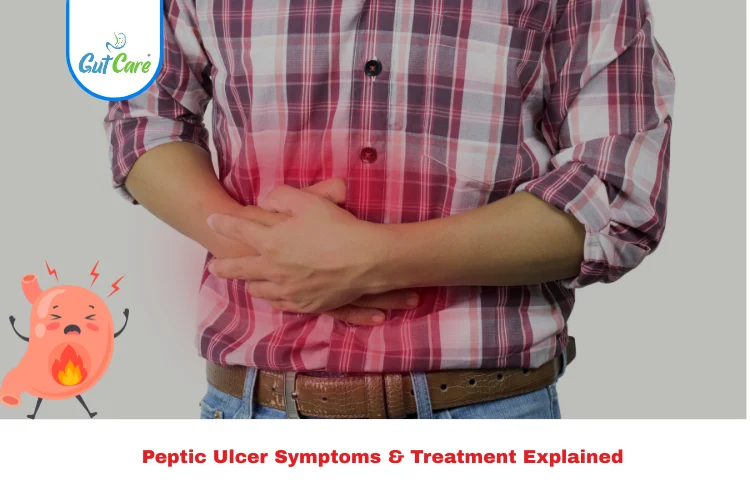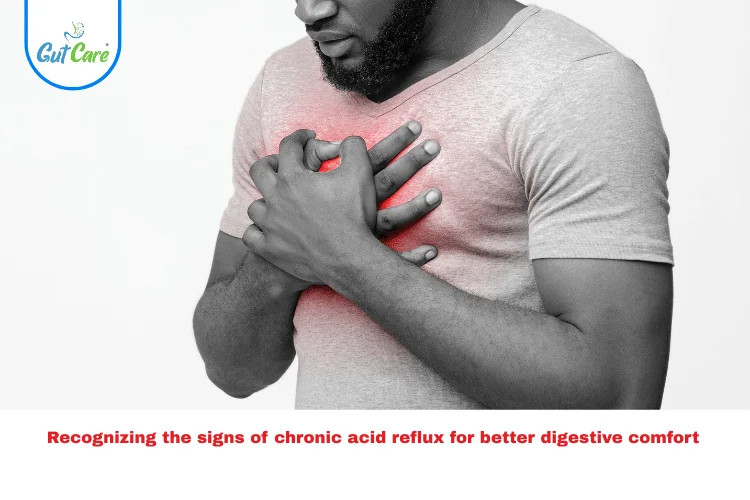A peptic ulcer is a painful sore that forms on the lining of the stomach, small intestine, or esophagus due to damage from stomach acid. It’s a common but often misunderstood condition that, if left untreated, can lead to serious health issues. At Gutcare Clinics, a trusted gastroenterology center in Bangalore, we specialize in the accurate diagnosis and effective treatment of peptic ulcers, helping patients recover safely and quickly.
This guide will help you understand what causes peptic ulcers, how they’re diagnosed, and the most effective treatment options available. Whether you’re dealing with stomach pain, bloating, or recurring indigestion, knowing when to seek expert help can make all the difference.
What Is a Peptic Ulcer?
A peptic ulcer is an open sore or lesion that develops in the lining of the stomach, the upper part of the small intestine (called the duodenum), or the esophagus. These ulcers result from an imbalance between digestive fluids—mainly stomach acid and protective mucus.
Types of Peptic Ulcers:
- Gastric Ulcers: Occur in the lining of the stomach.
- Duodenal Ulcers: Found in the upper part of the small intestine.
- Esophageal Ulcers: Form in the esophagus, often caused by acid reflux or prolonged vomiting.
What Causes a Peptic Ulcer?
The development of a peptic ulcer is usually due to one or more of the following:
1. H. pylori Infection
Helicobacter pylori is a bacteria that can weaken the protective mucus in the stomach, allowing acid to damage the stomach lining.
2. Nonsteroidal Anti-Inflammatory Drugs (NSAIDs)
Regular use of NSAIDs such as ibuprofen, aspirin, or naproxen can irritate or inflame the lining of the stomach and intestines, leading to ulcers.
3. Excessive Stomach Acid Production
Conditions like Zollinger-Ellison syndrome or stress-related hyperacidity can lead to ulcers due to increased acid levels.
4. Lifestyle Factors
- Smoking increases stomach acid and slows healing.
- Alcohol can erode the stomach lining.
- Spicy foods don’t cause ulcers but may irritate existing ones.
Common Symptoms of Peptic Ulcers
Many people experience no symptoms at first, but as the ulcer worsens, it may lead to:
- A burning pain in the stomach (especially between meals or at night)
- Nausea or vomiting
- Bloating and frequent belching
- Loss of appetite or unexpected weight loss
- Blood in vomit or black, tarry stools (a sign of internal bleeding)
If you experience any of these symptoms, especially persistent abdominal pain, consult a doctor at Gutcare Clinics, Bangalore for a proper evaluation.
How Is a Peptic Ulcer Diagnosed?
Proper diagnosis is crucial to determine the cause and severity of the ulcer. At Gutcare Clinics, we use advanced tools to diagnose peptic ulcers effectively:
1. Endoscopy
A thin, flexible tube with a camera is inserted through the mouth to examine the stomach and small intestine directly. This is the most accurate method.
2. H. pylori Testing
This may involve:
- Breath tests
- Stool antigen tests
- Blood tests
3. Upper GI Series (Barium Swallow)
A contrast dye is swallowed, and X-rays are taken to detect ulcers in the upper digestive tract.
Treatment for Peptic Ulcers
1. Medications
Treatment usually starts with medications to reduce acid and eliminate infection:
- Proton Pump Inhibitors (PPIs): Reduce stomach acid and promote healing (e.g., omeprazole, pantoprazole).
- H2-Receptor Antagonists: Help reduce acid production (e.g., ranitidine, famotidine).
- Antibiotics: If H. pylori is present, a combination of antibiotics will be prescribed.
- Antacids: Provide quick relief by neutralizing existing stomach acid.
- Mucosal Protectants: Such as sucralfate, which coats the ulcer to protect it during healing.
2. Lifestyle and Dietary Changes
Lifestyle modifications are essential for managing and preventing recurrence:
- Avoid NSAIDs unless prescribed.
- Limit caffeine, alcohol, and spicy foods.
- Quit smoking.
- Eat smaller, more frequent meals.
- Manage stress through yoga, meditation, or therapy.
Home Remedies and Natural Support
Although medications are essential, some natural options can complement treatment:
- Probiotics: Found in yogurt and fermented foods, they may help restore gut flora balance, especially after antibiotics.
- Honey: Has antibacterial properties and may help reduce inflammation.
- Green tea and ginger: Soothing to the stomach and may help reduce irritation.
Note: Always consult with a doctor before starting any natural remedy, especially if you’re taking prescription medication.
When to See a Doctor
You should see a healthcare professional if:
- Symptoms persist for more than a few days
- Pain worsens or becomes more frequent
- You notice blood in vomit or stool
- You experience weight loss or difficulty eating
At Gutcare Clinics in Bangalore, we provide comprehensive care for peptic ulcers, from diagnosis to complete recovery, using a patient-first approach.
Preventing Peptic Ulcers
Prevention plays a crucial role in long-term health:
- Limit use of NSAIDs; use alternatives when possible
- Get tested and treated for H. pylori
- Eat a balanced diet rich in fiber, fruits, and vegetables
- Stay hydrated and avoid late-night meals
- Manage emotional and physical stress
Conclusion
A peptic ulcer may seem like a minor issue at first, but if left untreated, it can lead to serious complications such as bleeding, perforation, and even stomach cancer. Thankfully, with modern diagnostics and treatment options available at Gutcare Clinics in Bangalore, ulcers can be managed and healed effectively.
If you’re experiencing symptoms or have concerns about your digestive health, don’t wait. Book a consultation at Gutcare Clinics today and take the first step toward relief and recovery.
Frequently Asked Questions (FAQs)
1. What is the main cause of a peptic ulcer and how can I prevent one?
H. pylori infection or the use of NSAIDs are frequently the causes of peptic ulcers. While it is definitely possible to get a peptic ulcer even if you are not on NSAIDs, the likelihood is lower. If you are concerned about getting a peptic ulcer you may prevent it by limiting the use of NSAIDs, consuming a sensible diet, stopping smoking and/or drinking alcohol, and controlling stress.
2. What can I expect the first signs of a peptic ulcer to be?
Some early symptoms are a burning sensation in your stomach especially when it’s empty, nausea, indigestion and bloating. If these symptoms persist you should seek medical attention.
3. Will a peptic ulcer heal itself?
While a mild ulcer may possibly improve with diet, but usually full healing will require medical treatment, especially if a H. pylori infection or complications exist.
4. What foods should I avoid if I have a peptic ulcer?
You should avoid spicy foods, acidic foods, and fatty foods, in addition to caffeine and alcohol. Instead opt for bland high-fibre meals and drink plenty of water.
5. Why is Gutcare Clinics the best hospital for peptic ulcers in Bangalore?
Gutcare Clinics is the number one choice for peptic ulcer patients because of our expert ability to diagnose and personalized treatment plans for treating peptic ulcers and our state-of-the-art facilities. You can be assured that our gastroenterologists, with years of experience, will provide you with the best possible results there is.




